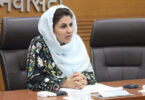KABUL (Khaama Press): Rina Amiri, the Special Representative of the United States for Women and Human Rights in Afghanistan, has stated that both domestic and international efforts to change the mindset of the Taliban administration towards women have been futile.
Ms Amiri, on Thursday, said on her social media platform X, formerly known as Twitter, “Taliban continue to ignore domestic and international requests to restore women’s access to education,” emphasizing, “Do not lose hope, you women and girls.”
The US Special Representative for Afghan Women made these remarks one day after “International Day of the Girl” while consistently defending the essence of engagement with the Taliban administration.
Rina Amiri addressed Afghan women and girls, writing, “We will continue to support you in defending your rights, including your right to quality education, by any means possible.”
According to her, the “Taliban’s strict policies” do not only affect Afghanistan but may set a precedent for other societies, impacting efforts towards gender equality universally.
Expressing concern over the Taliban’s mindset regarding women’s freedoms, Rina Amiri added, “Taliban’s strict policies are not just Afghanistan’s problem. They create a dangerous pattern that others may emulate.”
She said, “They (Taliban) are creating a dangerous precedent that others may follow.
This approach jeopardizes the rights of women and girls everywhere. It is our shared duty to resist these extremist policies meaningfully.”
It has been over two years since the resurgence of the Taliban administration in Afghanistan, during which United Nations organizations have described its restrictions on women’s lives and work as “draconian.”
From September 2021 to 2023, the Taliban administration issued over 50 decrees restricting women’s personal and social lives, targeting various aspects of women’s freedom for education and work and eroding them.
This is happening while, according to United Nations experts’ findings, gender apartheid prevails in Afghanistan. Continuing the current situation may lead to “sexual harassment,” which, under international law, is a crime against humanity.







